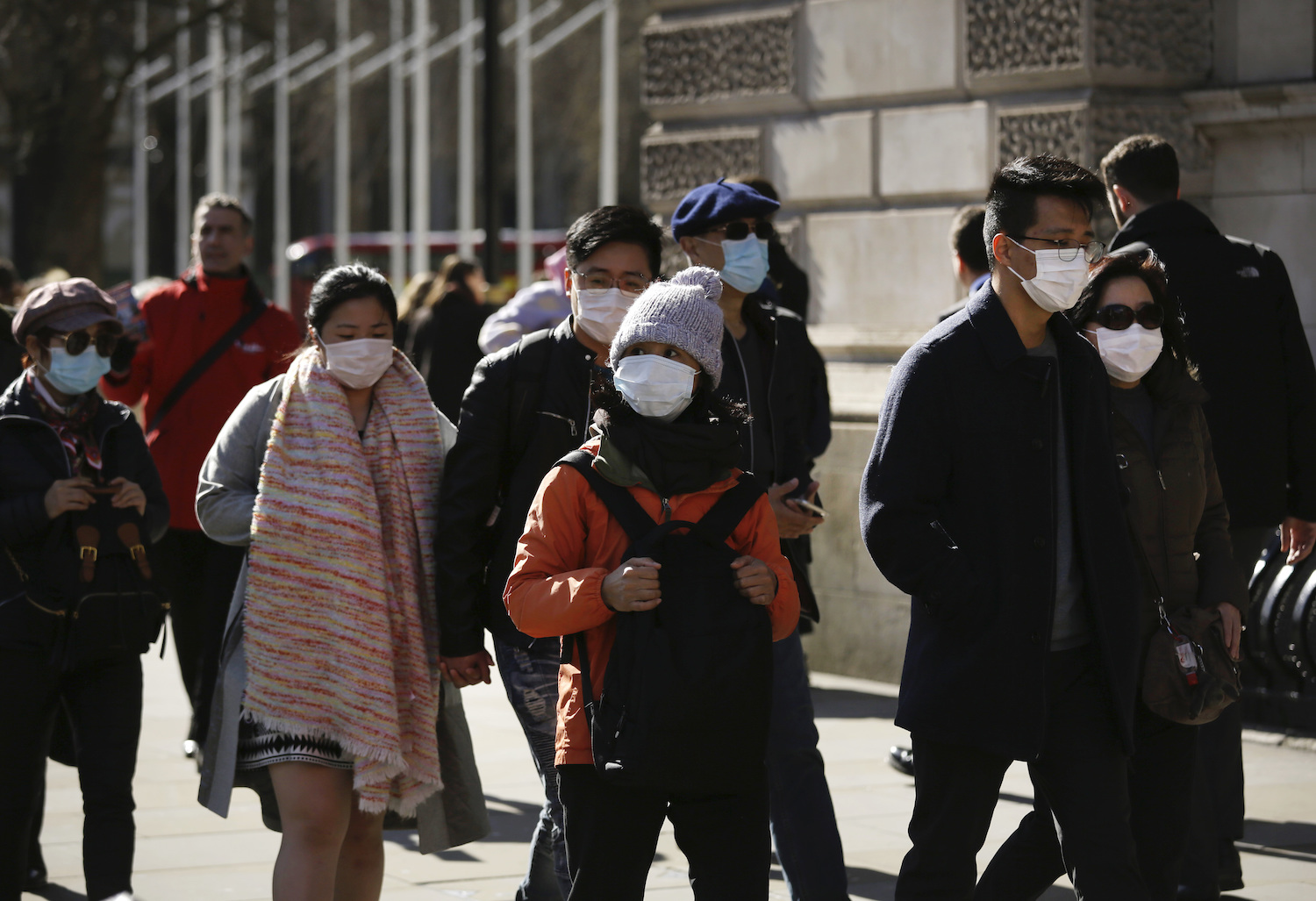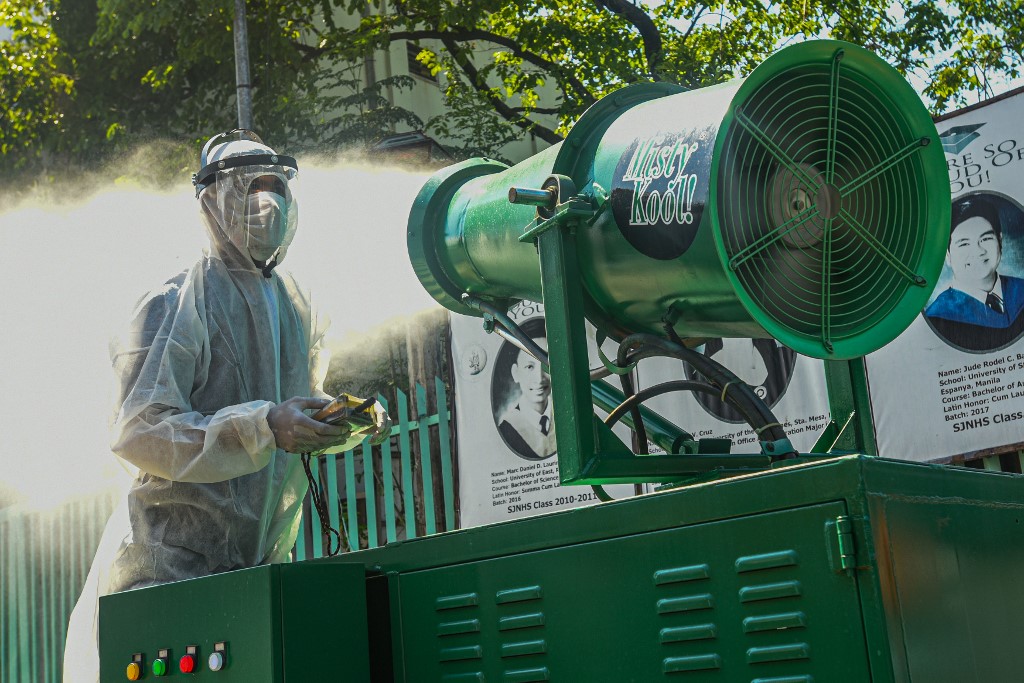DUBAI: As the Middle East continues to grapple with the coronavirus outbreak, governments in the region and around the world have been taking extra precautions to prevent the spread of the virus.
Wednesday, March 11 (All times in GMT)
-----
21:25 - A high-profile four-team international football tournament in Doha this month has been canceled due to fears over the coronavirus outbreak, the Croatian Football Federation said on Wednesday.
Croatia were due to feature alongside Portugal, Belgium and Switzerland from March 26-30 in preparation for the Euro 2020 finals to be staged in 12 venues across Europe starting in June.
20:50 - Italy's prime minister Giuseppe Conte announced on Wednesday that his government was shutting all stores except pharmacies and food shops in a bid to prevent the spread of the virus.
19:45 - Saudi Arabia has called on people to avoid gatherings exceeding 50 people and to refrain from shaking hands with each other to prevent the spread of the virus.
The first recovery from the virus in the Kingdom was also announced on Wednesday, with the patient discharged from a hospital in Qatif.
18:03 - Iraqi semi-autonomous Kurdistan regions bans Kurdish Nowruz festivals due to coronavirus fears - statement.
17:25 - Saudi Arabia has closed cinemas in the Kingdom until further notice due to coronavirus fears.
16:41 - Expressing increasing alarm about mounting infections, the World Health Organization declared Wednesday that the global coronavirus crisis is now a pandemic.
Tedros Adhanom Ghebreyesus, who heads the U.N. agency, said the WHO is “deeply concerned by the alarming levels of spread and severity” of the outbreak. He also expressed concern about “the alarming levels of inaction.”
16:36 - The death toll from an outbreak of coronavirus in the northern Italian region of Lombardy, which has borne the brunt of a nationwide contagion, has risen over the past day to 617 from 468, two sources with access to the data said on Wednesday.
One of the sources said the number of new cases in the region, which includes Italy's financial capital Milan, had risen by 1,489 over the past 24 hours.

People line up at a grocery store in the town of Codogno, in the region of Lombardy, northern Italy, Wednesday, Mar. 11, 2020. (AP)
16:12 - Lebanese Prime Minister Hassan Diab said that all flights to Iran as well as China, South Korea and Italy are to stop.

Lebanese men wearing protective masks look at rosaries offered by a street vendor on a shopping street in the Lebanese capital Beirut, on Mar. 11, 2020, amid fears from the coronavirus outbreak. (AFP)
15:59 - Sweden on Wednesday reported its first death from the new coronavirus, health officials said, the first person in the Nordic region to die from the outbreak sweeping the globe.
The victim was an elderly patient with an underlying illness being treated in the intensive care unit of a hospital in the capital, the Region Stockholm health authority said in a statement.
15:45 - Qatar has recorded 238 new coronavirus cases on Wednesday meaning the total number in the country is 262, according to the country's news agency.
15:30 - Egypt is to cancel all large events and gatherings in a bid to check the spread of the deadly coronavirus. FULL ARAB NEWS STORY HERE.
The Egyptian government’s decision has sparked controversy in the country where 60 cases of the COVID-19 infection have been recorded, so far resulting in one death.
15:25 - Kuwait to declare public holiday from March 12 till March 26 due to coronavirus outbreak - state news agency.
15:10 - Kuwait on Wednesday announced it will suspend commercial flights to and from Kuwait International Airport from Friday until further notice.
Arrival trips of Kuwaiti passengers and their close relatives will be restricted, with the exception of cargo planes, a statement issued on the Kuwait News Agency said.
14:35 - US National Security Adviser Robert O’Brien said China did not initially handle the coronavirus outbreak properly and this likely cost the world two months when it could have prepared and dramatically curtailed the outbreak.
14:30 - The number of confirmed cases of coronavirus in Lebanon is 61, the health ministry said on Wednesday.

People pass in front the emergency entrance of the government-run Rafik Hariri University Hospital, where most of the Lebanese coronavirus cases are treated, in Beirut, Lebanon, Wednesday, Mar. 11, 2020. (AP)
14:15 - The number of confirmed cases of coronavirus across the United Kingdom has risen to 456, up from 373 a day earlier, the health ministry said on Wednesday.

People wear protective face masks as they walk outside Parliament in London, Wednesday, Mar. 11, 2020. (AP)
13:30 - Saudi Arabia’s Embassy in Lebanon said two flights have been organized in coordination with Middle East Airlines to evacuate Saudi citizens and their families who wish to leave the country over coronavirus fears.
One of the flights will leave for King Khalid International Airport in Riyadh at 8 a.m. on Saturday and the other will leave for King Abdulaziz International Airport in Jeddah on Sunday at 8 a.m.
13:00 – Finance minister Rishi Sunak said on Wednesday he would set aside $6.5 billion (£5 billion) to help Britain’s National Health Service and other public services tackle the coronavirus outbreak. In his first annual budget statement to parliament, Sunak said he would go “further if necessary”.
11:00 – The third death related to coronavirus in Germany has been confirmed.
10:50 – Iran reported 63 new virus deaths, taking the total to 354, and infection cases now at 9,000.
10:15 – Morocco announced two new coronavirus cases, involving the wife and daughter of a French tourist who was earlier contracted COVID-19. They were both quarantined for two days before testing positive for the virus.
10:00 – The Philippines has reported 6 new COVID-19 patients, bringing the total number of those who have been infected to 49.

A government worker disinfects a high school in Manila, Philippines on March 9, 2020. (AFP)
10:00 – Lebanon announced eight new cases of coronavirus infections, and a second death from the virus.
09:30 – Beijing on Wednesday ordered people arriving in the city from any country to go into 14-day quarantine as China reported an increase in imported coronavirus cases, threatening its progress against the epidemic. China has made major strides in its battle against the virus, prompting President Xi Jinping to visit Wuhan, the central city at the heart of the global epidemic, on Tuesday and declare that it has “basically curbed” the spread of the disease.
09:05 – Iraqi cleric Moqtada Al-Sadr said he would reject any coronavirus treatment produced by the US.
08:40 – Iraqi Kurdistan regional officials said nationals have four days to return from Iran before borders are closed.
08:25 – Belgium reported its first coronavirus death, a patient who was 90 years old, according to Belga news agency.
08:10 – Iraq canceled Friday prayers in the Shiite holy city of Kerbala due to concerns about the coronavirus, a statement from the administration of the city’s holy site said on Wednesday.
Kerbala, like the neighboring holy city of Najaf, attracts Shiites pilgrims from Iraq and abroad. Prayers had already been canceled last Friday.
07:50 – Bahrain has quarantined 77 of the 165 people who have been evacuated from Iran, after they tested positive for the virus.
07:45 – Three new cases of coronavirus were confirmed in the past 24 hours, the Kuwait health ministry said, bringing the total to 72. About 916 people have also been quarantined as a precaution against the spread of the virus. Thousands of volunteers are helping to control the spread of the virus in the country, health officials added. Kuwaiti officials likewise advised residents and citizens to avoid travel and warned against wrong information and fake news, and advised everyone to only rely on official announcements.
07:25 – Thailand on Wednesday cancelled the grant of visa on arrival for 18 countries and visa exemption for three others to contain the spread of the coronavirus, the country’s interior minister said.
Previously, nationals of 18 countries or territories could use their passports or travel documents to apply for Visa on Arrival at Thai immigration checkpoints.
The 18 places include Bulgaria, Bhutan, China (including Taiwan), Cyprus, Ethiopia, Fiji, Georgia, India, Kazakhstan, Malta, Mexico, Nauru, Papua New Guinea, Romania, Russia, Saudi Arabia, Uzbekistan and Vanuatu.
07:15 – In Oman, the Director General of Medical Services of the Royal Oman Police said that an integrated medical team will operate the mobile police hospital to deal with coronavirus cases in the country. The mobile hospital includes an intensive care unit and a laboratory for tests, he said.
“In cooperation with the Ministry of Health, the police are working on epidemiological monitoring of upcoming cases through outlets,” he added.
06:50 – Iraq has announced its second coronavirus death in Kerbala.
06:05 – Indonesia has announced its first coronavirus death in the country.
00:10 – Bolivia has confirmed its first two cases of coronavirus, Health Minister Anibal Cruz said in a public address.
Tuesday, March 10 (All times in GMT)
19:45 – Turkey announced its first coronavirus case, a man who had recently travelled to Europe and is in good health.
“The test of a patient suspected of carrying the coronavirus returned positive,” Health Minister Fahrettin Koca said in a television broadcast.
He added that the man was likely to have contracted COVID-19 while travelling in Europe, but declined to say which country or where in Turkey the patient had been hospitalized.
This video explaining how COVID-19 transmits person to person was produced by the World Health Organisation
18:35 – In Oman, the Diwan of Royal Court issued a statement saying a committee will be formed to handle the developments resulting from coronavirus. The statement said the committee will monitor the spread of the virus and regional and international efforts taken to combat it. The committee will also follow up all procedures taken to control the spread of the virus, the statement added.
16:20 – Bahrain’s Ministry of Health announced the recovery of eight individuals from the coronavirus. The announcement brings the total number of confirmed recoveries to 30.
16:15 – In Tunisia, a sixth confirmed coronavirus case was announced on Tuesday evening, after the results of tests carried out on 44 people suspected of carrying the virus were disclosed.




























